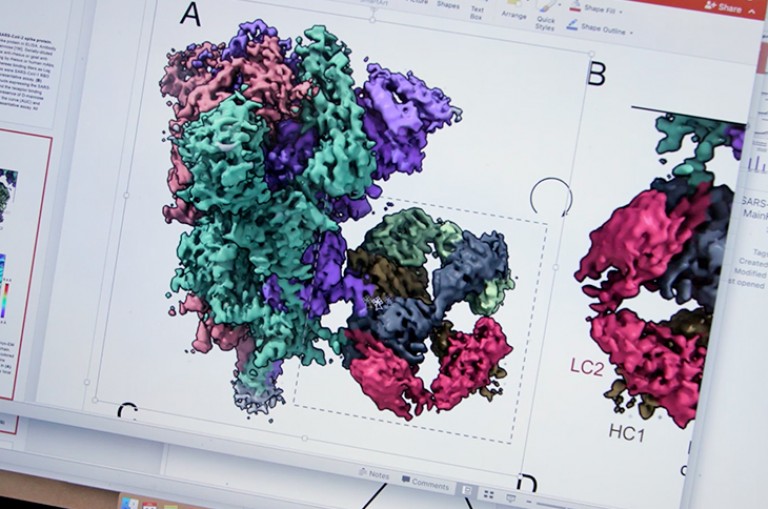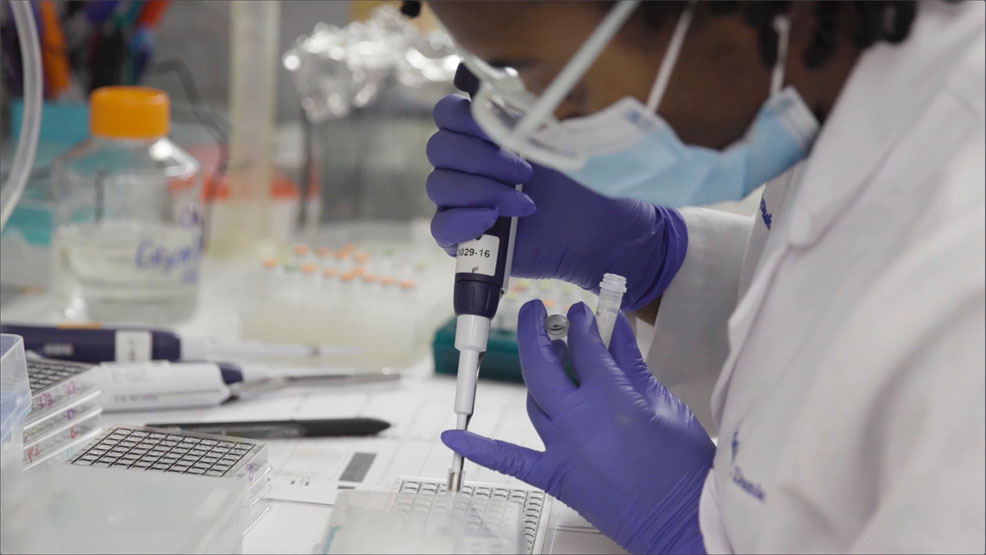
3rd June 2021 Multi-strain vaccine blocks COVID-19 in monkeys A pan-coronavirus mRNA nanoparticle vaccine with activity against all major SARS-CoV-2 variants has been described in the journal Nature, showing 100% effectiveness in macaques.
A potential new vaccine developed by a team at the Duke Human Vaccine Institute (DHVI) has proven effective in protecting monkeys and mice from a variety of coronavirus infections – including SARS-CoV-2, as well as the original SARS-CoV-1 and related bat coronaviruses that could potentially cause the next pandemic. The new "pan-coronavirus" vaccine triggers neutralising antibodies via a nanoparticle. This nanoparticle is composed of the coronavirus part that allows it to bind to the body's cell receptors, and is formulated with a chemical booster called an adjuvant. Success in primates is highly relevant to humans. "We began this work last spring with the understanding that, like all viruses, mutations would occur in the SARS-CoV-2 virus, which causes COVID-19," said senior study author Barton F. Haynes, M.D., director of the DHVI. "The mRNA vaccines were already under development, so we were looking for ways to sustain their efficacy once those variants appeared. "This approach not only provided protection against SARS-CoV-2, but the antibodies induced by the vaccine also neutralised variants of concern that originated in the United Kingdom, South Africa and Brazil. And the induced antibodies reacted with quite a large panel of coronaviruses." Haynes' team – whose work is published in Nature – built on earlier studies involving SARS, a respiratory illness caused by SARS-CoV-1. The original SARS virus emerged in November 2002, lasting until May 2004, with over 8,000 cases and 774 deaths, mostly in East Asia. The DHVI team found that a person infected with SARS developed antibodies capable of neutralising multiple coronaviruses, suggesting that a pan-coronavirus vaccine might be possible.
The Achilles heel for the coronaviruses is their receptor-binding domain, located on the "spike" that links the viruses to receptors in human cells. While this binding site enables it to enter the body and cause infection, it can also be targeted by antibodies. The research team identified one particular receptor-binding domain site that is present on SARS-CoV-2, its circulating variants and SARS-related bat viruses that makes them highly vulnerable to cross-neutralising antibodies. They then designed a nanoparticle displaying this vulnerable spot. The nanoparticle is combined with a small molecule adjuvant – specifically, the toll-like receptor 7 and 8 agonist called 3M-052, formulated with Alum, which was developed by 3M and the Infectious Disease Research Institute. The adjuvant boosts the body's immune response. In tests on monkeys, the nanoparticle vaccine blocked COVID-19 infection by 100%. It also elicited significantly higher neutralising levels in the animals than current vaccine platforms or natural infection in humans. "Basically what we've done is take multiple copies of a small part of the coronavirus to make the body's immune system respond to it in a heightened way," explained lead author Kevin Saunders, PhD, director of research at DHVI. "We found that not only did that increase the body's ability to inhibit the virus from causing infection, but it also targets this cross-reactive site of vulnerability on the spike protein more frequently. We think that's why this vaccine is effective against SARS-CoV-1, SARS-CoV-2 and at least four of its common variants, plus additional animal coronaviruses." "There have been three coronavirus epidemics in the past 20 years – so there is a need to develop effective vaccines that can target these pathogens prior to the next pandemic," said Haynes. "This work represents a platform that could prevent, rapidly temper, or extinguish a pandemic."
Comments »
If you enjoyed this article, please consider sharing it:
|








